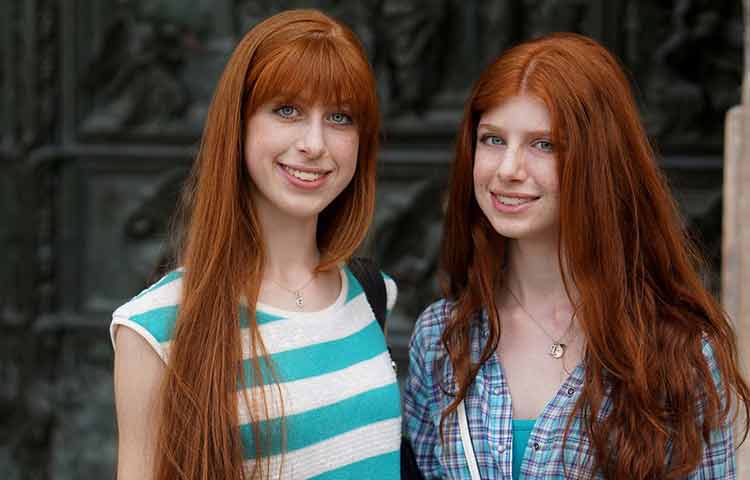What Is the Most Common Eye Color for Blondes
They say beauty lies in the eye of the beholder, but in some cases, beauty thrives in what's unique. Unlike the usual dark brown, black, brunette, and blonde hair hues we see out there, there's a group of people who are natural redheads. Yes, dark red to ginger is very common in areas like Ireland and very uncommon in other continents like Africa.
What's more fascinating is that there more to it than just the unique color of the hair, it's the hair and eye combinations. A small percentage of people have unique blends such as red hair and blue eyes, or blonde hair and green eyes. These are just but a few of scientific wonders that has people hoping to see even once in their lifetime.
Rarest Hair Colors and Facts About Them
Redheads
Redheads and blondes have the least number of people that don't surpass even 20% of the world population.

Precisely, individuals with red hair are the least common with less than two percent of the global population. Let's have a look at interesting facts about them;
- The genetic mutation of a redhead means that both parents have to be carriers of the MC1R gene to produce a redhead offspring. This then reduces the chances to over 50%.
- Redheads are greatly populated in Scotland and Ireland.
- Redheads more often than not have a European ancestry either northern or western.
- People with red hair are seen to be more attractive than other types of people with blonde, black, or brunette.
- Red hair is the hardest to dye. Its pigmentation is deeper, harder, and tighter to remove or change than any other type of hair. If forced, it could cause damage to the hair.
- Red hair is thicker than any other hair type. Many claim it's a compensation to the fact that they have fewer hair strands than other hair tones.
- Redheads with blue eyes form the rarest hair combo in the world.
- Redheads are sewn to be more sensitive to pain than any other gene thanks to its gene the melanocortin 1 Receptor MC1R.
- Red hair doesn't turn grey.
- Redheads can generate their own vitamin D when they are exposed to low light environments. This is because they naturally have lower melanin concentration.
- The recessive trait of redheads claims they are more likely to be left-handed.
- Redheads may drastically reduce in the future due to their unique genes.
Blonde
Blond hair is identified by low levels of the dark pigment eumelanin. The resultant visible hue depends on various factors, but always has some yellowish color.

Following are facts about blondes
- Only 2% of people in the world are natural blondes.
- Blonde hair can range from practically white (platinum blonde) to a dark golden blonde. Strawberry blonde, the mixture of blonde and red hair, is the rarest type of blonde hair
- Blond hair tends to turn darker with age
- The Melanesians of New Guinea are the only dark-skinned group of humans known to have a high blonde hair rate
- Northern Europe has the most blondes.
- Blondes are typically more outgoing and lively and are perceived as more feminine than women with other hair colors.
- Blond beards grow faster than dark beards.
- Blonde-haired heads have more strands of hair than red- or dark-haired heads. Blondes have approximately 140,000 hairs compared with 108,000 for their darker counterparts
- Low levels of both eumelanin and phaeomelanin characterize blonde hair.
- Blonde women are more susceptible to age-related macular degeneration (AMD), an eye condition that can cause blindness
- Blondes produce less melanin, which leaves their skin more susceptible to skin cancer
- Scientists believe that blonde hair evolved in sun-deficient climates so that the body could synthesize vitamin D more efficiently
- Having blonde hair doesn't necessarily mean having blue eyes.
- While blonde hair is a recessive gene, it is not a disappearing gene.
Rare Hair and Eye Color Combinations
Genetics plays a huge role in just how rare some of these combinations are. Green eyes are rare, but so are blue eyes, red hair is even rarer compared to straight blondes. But what tops the list is red hair and blue eyes. A review by medical daily explains that these two traits are recessive genes, therefore, reducing the number of individuals to extremely low.
Statistically speaking, redheads are only two percent of the global population, while blue eyed individuals make up 17%, a stunning total of only 13 million people in the entire world. This makes this combination the rarest hair and eye color combination there is.
Natural Red Hair, Blue Eyes
As explained above, redheads with blue eyes top the list for the rarest gene combination. How comes? Well for these two traits; hair and eye color the genetic characteristic falls into the recessive form, which means it has to be passed done from the parent; both parents actually.
Biology dictates that the parents can pass down recessive, dominant, or both types of genes to their offspring. Brown hair, black hair, brown eyes are examples of dominant genes, while red hair, blonde, blue, and green eyes are recessive traits. For one to have red hair and blue eyes, the parents have to give them the MC1R recessive gene for red hair and the one for blue eyes.
So depending on which genes the parents have the child has zero to 100% chance of getting this unique combination.
What about gender disparities? Women take a higher percentage of red hair compared to men. However, research also shows that Caucasian men have more blue eyes that any other group of people. Hence, women have a higher gene mutation for the melanocortin 1 receptor (MC1R). They produce more pheomelanin responsible for the red hair than eumelanin that produces shades of black and brown.
Red Hair and Green Eyes
Next up is red hair and green eyes. This blend isn't as unique as the first one since green eyes are actually more common than blue eyes. It has a correlation of -0.14 %, just slightly higher than red hair and blue eyes. However, it's still unique.
For these combinations, the same genetics apply, the parents have to offer two recessive genes for this trait so the child can possess both red hair and green eyes. However, some areas have dominating genes which can more likely than not increase the chances of getting this combination. For example, redheads are mostly found in Scotland, Ireland, and parts of Great Britain. Grey eyes are common in Scandinavia and northern Europe countries like Denmark, Iceland, Norway, and Sweden.
Even so, there are still genetic complexities that make it hard to dictate these traits for your offspring.
Blonde Hair and Green Eyes
Blondes make up about five percent of the world population, just three percent higher than redheads. Combined with green eyes, they make up a set of equally unique combinations. Even so, green-eyed individuals are much more common nowadays.
The genetic combination of blonde hair and green eyes takes place once the haploid chromosomes from your parents happen to be exactly the same, therefore you inherit these polygenetic genes. However, there's still a 50% chance of getting these combinations even if your parents don't have it as some individuals are carriers or could have alleles for this particular blend of recessive traits.
Other Rare Combinations
Other studies indicate more rare combinations such as amber eyes and blonde white hair. You can imagine a natural blonde like Drew Barrymore with amber eyes. Most people claim that this combination has only been seen once or in photographs.
Another combination is an individual of African or Indian descent with natural black hair with blue eyes; either dark or true blue. Such a combination is equally unique as most haploid chromosomes will have people with black hair and black eyes, brown eyes, hazel eyes, or uniquely; green eyes. The possibility of such a combination means someone has this carried gene through hereditary cells.
Rare eye color combinations. There are other shades of eye color out there that haven't yet been matched with the right hair color. For example, red/ pink eyes for albinism can't really be matched with blonde hair. Also, grey, violet, and purple eyes from people who have very little melanin, with redheads.
Most Common Hair and Eye Color Combinations
For the remaining over 90% of the population lies under black or brown hair, with others lying in between as brunettes. The most common hair and eye combination for such is brown hair with brown eyes. This is due to the nature of brown genes being a dominant gene. Hence, even when combined with red hair genes, which is a recessive allele, the offspring will still have brown hair.
As for the brown eyes, 50 – 70 % of the global population had brown eyes. This in total leaves an estimate of 65 to 75% of the world's population with brown hair and brown eyes. Even so, various factors come into play when discussing commonalities. For example, northern Europeans have green eyes, people in Scotland and Ireland, commonly have red hair. Asians have black hair and black eyes.
Other common hairs and eye combinations include;
Blonde Hair and Blue Eyes
This is a blend that others claim is overrated. Very common with true Americans. However, the natural blend is harder to acquire since the number of true blondes is slightly under 10% of the global population. Even so, this is a combination that's not hard to find.
Brown Hair and Light Hazel Eyes
Light hazel is the lightest form of brown eyes, just very bright when reflected on the sun. This is a very common combination as it also lies within the brown hair, brown eyes combination. The combination is subtle, warm, and well put together. Perfect for a warm skin tone and attractive to many, especially women.
Red Hair and Dark Blue Eyes
Red hair and blue eyes is a hard combination to find, actually the rarest combination. However, dark blue is actually very common. In such a case one can only notice the blue in the eyes once sun or bright light is reflected in the eyes, therefore, the eyes seem dull and uncannily dark compared to the true blue color.
Brown Hair and Green Eyes
Most articles you'll read about green eyes, you will also note that they pair very well with brown hair. Brown to also mean brunettes. This is a classic combination for all those light to dark brown-haired people.
Blonde Hair and Dark Brown Eyes
Having a nice blonde hair means your facial features are already lighter just by having almost white hair. Hence, dark brown eyes add a sense of subtle to the mix. Dark brown eyes that resemble black eyes leaves the hair with a rich color and eyes to complement.
Brown Hair and Blue Eyes
Brown-haired people, just like blondes also look great with blue eyes. The combination is captivating and alluring to have light to medium brown hair matched with bright colored eyes. However blue eyes, still require the recessive gene present so as to pass it on to an offspring.
Black Hair and Green Eyes
Black hair is a very common trait for fair-skinned people. Just as much as green eyes are. Dark green eyes like emerald appear close to brown eyes which eliminates the uniqueness of this combination. Since green eyes is not an origination factor affected by location, it can be seen in just about any person, as long as one or both parents have this recessive gene.
What Is the Most Common Eye Color for Blondes
Source: https://hairsentry.com/rarest-hair-color-eye-combinations/